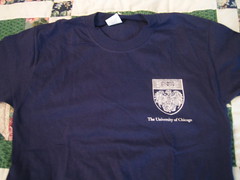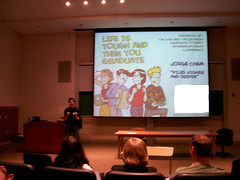Why did you choose to study overseas?
I feel honored to be featured in an entry by Scholarsheep, a production of the Scholarships Committee of Victoria Junior College (VJC) in Singapore. [Ed: Wah, now schools are taking note of my humble abode in cyberspace huh?]
The blog author (I assume it is Mrs Wee WH, VJC's HOD Careers & Scholarships) had asked a good question: Just what is it about going overseas that is so, if I may use the term, "romantic"?
My reasons for attending Graduate School (in the US) were already detailed previously. As you can tell by now they are hardly "romantic", more for practical (selfish?) purposes. Ironically, I lost my first SO by choosing to leave. (History might repeat itself, but I digress)
Now for the undergraduate education part - well, I do not exactly have a good compelling explanation for it. Parents? Sure, they strongly believed in the economic value that the coveted foreign degree cert can bring to status conscious Singapore. But why did I not choose NUS (or the other two local universities)? In my JC class, after the A levels/NS approximately 40% went overseas, another 40% to NUS and the remainder to NTU/SMU. Incidentally, those with the worst A level grades in the class (2 A level distinctions and fewer) ended up in NTU.
If you are to ask me six years ago this question - I would probably tell you something like: Oh, I want to learn from the best teachers in my field; after all, they wrote the pioneering/landmark textbooks for this discipline. Or I want to be independent and be away from the watchful eyes of my parents. On hindsight while these are reasonable, I think counterpoints can be easily made. Being able to write good textbooks doesn't necessarily mean they can teach effectively. Want to have an independent lifestyle? You can always stay in the school hostel or rent an apartment near campus.
I used to believe that the educational experience at a top-notch foreign university is better than an equivalent one at a local university simply because the professors overseas are more well-known and are winners of such prestigious international awards as the Nobel Prize, or are elected fellows of the American Academy of Arts and Sciences/Engineering etc. What I didn't know then, but I do now is that - the more well-known/established the professor is, the less time he/she has for teaching. And as undergraduates, you are at the bottom of the academic food chain.
Taken off Xue, a quote from Erik Ringmar, a Senior Lecturer at the LSE Government Department:
After all, the greatness of a scholar is measured in terms of output — that is, research. It is more than anything the number of books and articles written that matters to academic promotions. If you want a high-flying academic career you have to publish.
This means that the first-class teachers usually will have their minds elsewhere than on undergraduate teaching. They might be away on conferences, and even if they are not absent in body, they may be absent in mind. This is too bad of course. In fact it could indeed be that students have more opportunities for interaction with faculty members at lesser institutions — like the London Metropolitan University, say — where research is less heavily emphasised. I don’t know.
What I do know is that the in-class student experience often differs very little between the LSE and a place such as the London Metropolitan University. This may surprise you but it something students tell me. Instinctively I rebel against this conclusion, but I have come to believe that the students who make this point are correct.
Think about it! The kinds of courses taught at undergraduate level are pretty much the same everywhere you go. The courses use the same kinds of reading lists, with the same kinds of books, set the same kinds of exam questions … The lecturers too are not that different from each other. This is easily explained. Often after all we went to the same universities.
I compared course/lecture notes with peers studying the same course at NUS, and the materials covered pretty much overlapped. They kaopehed about lousy lecturers from the PRC and India with hard-to-understand accented English; I bemoaned the fact that in some of my classes the teaching assistants (TAs) taught for more than half the semester because the professor was always away for some conference.
What stood out instead for the educational experience is not so much the professors, but the quality of the student population. Borrowing from Erik again:
the student body
This may in some ways sound like a con, and some LSE students do indeed end up thinking so. They are disenchanted with the ‘elite institution’-label and wonder what all the fuss is about. They prefer something less elite and more approachable and perhaps they even end up transferring to places like the London Metropolitan University. I remember this reaction very clearly from my own time as a student at another elite institution — Yale University in the United States.
Let me suggest to you why transferring down would be a mistake. What makes the LSE unique not only in Britain but in the world as a whole — and into a vastly different kind of institution than all of its local competitors — is the quality of its student body. We are able to recruit some of the smartest, most interesting, intelligent, rich, successful and all-round attractive people on the planet. That is, we are able to attract people just like you!
...
Great American universities like Harvard and Yale may pride themselves in their multiculturalism, but they know little about it. At Yale we were some token foreign students in a corner of the classroom, but the majority of the students were regular, all-American, kids. This is not the case at the LSE. There may be more English students here than others, but we don’t do ‘minorities,’ we are all minorities of some kind or another. Everyone is included, no one cannot take part.
This is why the official language of the School is broken English. Personally I speak this language perfectly fluently.
However it is only in Graduate School, that I finally fully understand the above.
-------------------------------------------------------------------
Mr Wang has three posts related to the admissions decisions made by the local universities. Perhaps these can be counted as reasons to why you should head overseas. Read Dominic's take too.
Edit (28 Apr): Sg_Ljers has two similar posts.
-------------------------------------------------------------------


Heh heh. Paiseh, cannot help it. U of C's school crest looks very much like RJ's.








